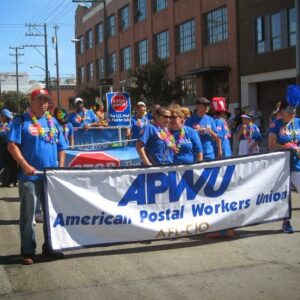December 14, 2025
Bargaining Rights Make a World of Difference
(This article appeared in the March/April 2010 issue of The American Postal Worker magazine.)
Wiliam Burrus, President
Over the past several years I have been combing through the union’s archives to compile a record of contractual changes over the past 30 years. While doing this research on collective bargaining achievements since 1980, it occurred to me that more than 90 percent of the APWU members working today have fewer than 30 years of service: Their entire careers have been influenced by the union’s efforts during this period of time; Moe Biller and I are the only APWU presidents that these members have known.
My research reveals gradual but steady increases in wages, from $17,000 in 1980 for a Grade 6, Step O, APWU-represented worker, to $53,000 in 2010. The record also reflects the Mail Processor level increases from Grade 3 to 4, from 4 to 5 — and eventually to Grade 6 in 2008 when all APWU-represented employees were upgraded.
The years of collective bargaining have also resulted in the conversion of all part-time flexibles in the 440 largest offices; the elimination of the PTF category in those facilities; the right to consecutive off-days; bidding on Limited Duty assignments; protection for Family and Medical Leave; an annual-leave exchange; bereavement leave; the use of Leave Without Pay; and numerous other improvements to conditions of employment.
Quite simply, the conditions of postal employment are the results of the uninterrupted efforts of the union on behalf of the postal workers the APWU represents.
Put in Perspective
While trying to put all of these changes in perspective, I recalled a letter I received several years ago from a non-member who, to put it charitably, had been taking his benefits for granted.
Responding to a membership solicitation from my office, he expressed his belief that all of the changes that had taken place since he became a postal employee were merely conditions of employment for which he qualified by passing the entrance exam and showing up for work.
I wish that the scenario he imagined were so simple, that changes to the conditions for working people were a matter of course. If that were the case, however, employees at Walmart and other non-union employers would have received similar advances in wages and conditions over the past three decades.
My review tells a vastly different tale. It was the union that negotiated improvements to nearly every aspect of employment over the 30-year period of my research. I am confident that without collective bargaining, the workplace conditions of 30 years ago would still apply in 2010. In fact, those employment conditions we have been unsuccessful in changing remain as they existed in 1980.
The Choices We Make
Looking back over this span of time, postal workers may wonder: If they had it to do all over again, would they have made other choices of employment?
For the most part, we did not have the training or opportunity to become doctors, lawyers, or accountants, or to select other professions in which we could demand superior employment conditions.
So, given the confines of our career path, would we as postal workers prefer that we had chosen a different occupation? For many of us, automobile and steel plants were viable employment options 30 years ago, but there is little comparison today in the quality of those occupations. Maybe we could have chosen retail or health care. It’s not that difficult to imagine, so draw your own conclusions. If you had decided to work for _____ (you can fill in the blank) 30 years ago, would your life be better or worse?
My research leads me to conclude that those individuals who chose in 1980 to spend their careers as postal employees in a bargaining unit represented by the American Postal Workers Union have served themselves and their families well. Without sacrificing one hour to a work stoppage during this 30-year period, they have maintained a comfortable standard of living.
We can be proud of our accomplishments over this timeframe: We succeeded in securing jobs that have paid mortgages, fed families, educated children, maintained good health, and provided peace of mind that our employment would continue throughout our working years.
My review of the archives brings back the memories of each issue and its importance at the moment it was given attention. In context, the issues of yesterday mirror the issues of today; they just have different names. Each was a part of the struggle that brought us where we are today.
A Front-Row Seat
The contract negotiations that begin in August will be but a continuation of this struggle. New challenges will be presented: Never before in the history of the Postal Service — or the Post Office Department that preceded it — has the institution experienced the decline in mail-volume and the subsequent increase in postal debt at the magnitude of 2009. Undoubtedly, these factors will be cited repeatedly by management in its efforts to limit improvements in our conditions of employment. However, the union anticipates and welcomes serious dialogue about the USPS financial condition, mail-volume, workshare discounts, and the obligation to fund current and future retiree healthcare.
I wish that every APWU member could have a front row seat at bargaining, and could witness the opposing views on each of these issues. I wish every union member could hear the union describe the sacrifices and contributions of postal employees. The major mailers often try to impress upon the postal world that absent their contributions to volume, the Postal Service could not exist. But I counter with the reality that without postal employees, their mailings would just be pieces of paper with no destination.
From a front-row seat, our members would be able see the charts and graphs reflecting the reduction in the APWU bargaining unit in comparison with other employee groups; the union offer to perform all mail processing for less than the 10.5-cents-per-letter rate that postal management says represents the portion of mail-processing costs avoided by worksharing; and the bogus retiree healthcare funding requirement that Congress sees fit to include among operating expenses.
These and other opposing points of view will be on display as the negotiators seek common ground for agreement. The APWU will enter the process with a sense of optimism that a voluntary agreement is within our grasp. But we also will show firm determination that if we are faced with ultimatums for givebacks, we will respond appropriately.
We have come a long way — too far to consider going back.


